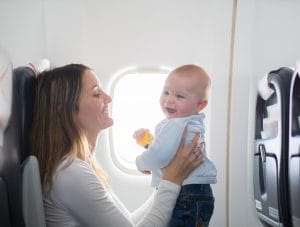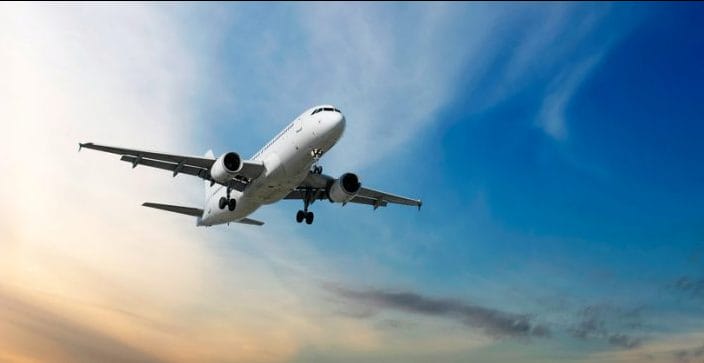 Pre-boarding is essential for those with food allergies. Photo: Getty
Pre-boarding is essential for those with food allergies. Photo: Getty It is not hard to notice that air travel has become more stressful for those of us flying with food allergies. As a food allergy mom who regularly pre-boards aircraft, I know that I only have a few minutes before the regular boarding begins. Preventing exposure is essential, so I quickly wipe down my son’s seating area including his seat, seat belt, tray table, light switch and surrounding areas. I try to model the behavior that I want my son to emulate when the day comes that he’s flying alone.
Passengers with a food allergy do not expect an allergen-free environment. Rather, we try to take reasonable precautions to mitigate the risk of an in-flight reaction. However, we do need all of the airlines to help us, and share the responsibility by allowing us to take preventative measures that make flying safer.
There are 32 million people in the United States alone who live with food allergies. Testimonials on my No Nut Traveler website indicate many food allergy passengers on airlines experience disconcerting situations, including being denied the ability to pre-board. It is critical to do so, since cleaning residue from the previous flight is difficult during the general boarding crush.
I was heartened as an advocate for airline food allergy accommodations when, in early 2017, the non-profit Food Allergy Research & Education (FARE) took a stand and called out American Airlines (AA) for a policy that specifically denied passengers with food allergies the right to pre-board and wipe down seating areas. FARE said the practice of denial for this one health condition was “discriminatory” and launched a complaint with the U.S. Department of Transportation (DOT), stating that American Airlines had violated the Air Carrier Access Act.
Last week, DOT dismissed FARE’s complaint against American Airlines. Its decision was based on the fact that in late 2018, American Airlines retracted the old policy and its new policy now permits pre-boarding for those with “nut allergies” (which includes peanut and tree nut allergies). DOT, in the same vein, also dismissed a related complaint from Alicia White, a Virginia woman whose family was denied pre-boarding on an AA flight related to her child’s peanut allergy. The family felt they had no choice but to book tickets with an alternate carrier.
DOT’s decision concluded that by modifying its policy in the wake of the FARE and White complaints, American Airlines had come into compliance with the Air Carrier Access Act.
Policy Excludes Too Much of Community
It’s true: American Airlines did amend its original policy, which forbade pre-boarding for peanut or tree nut allergies. However, FARE clearly said in its complaint that the policy was applied more broadly – and had excluded those with other food allergies. Commenting on the dismissal, FARE’s CEO Lisa Gable said: “While the Department of Transportation concluded that American Airline’s change in policies resolved our complaint, there is more work to be done to ensure that the needs of passengers with food allergies – not just peanut or tree nut – are accommodated.”
It is frustrating for those of us lobbying for better accommodations for all who fly that AA’s new policy doesn’t include as much of the allergic population as we believe it should. On the face of it, DOT’s actions may look like a loss.
However, Mary Vargas, the disability lawyer with the firm Stein and Vargas who acted on both complaints, points out that DOT’s decision contains a new and important interpretation of the Air Carrier Access Act (ACAA); one that supports food allergy accommodations in the skies.
DOT Clarifies That Food Allergy is a Disability
Vargas said in an interview that the DOT order is critically important to the food allergy community in two respects. “First, DOT makes clear that it views individuals with food allergies as entitled to the protections of federal disability rights laws,” she says. This is music to my ears as a food allergy airlines advocate, since many air carriers and even disability rights groups have told me in the past that it is unclear whether food allergy is considered a disability under the ACAA’s section 382.5, which defines physical disabilities.
“Second,” says Vargas, “it gives passengers who need pre-boarding because of their food allergies an authoritative statement from DOT that airlines must afford them this right.”
FARE’s Lisa Gable similarly noted: “The Department of Transportation has stated with clarity that individuals with food allergies can qualify as having a disability under the Air Carrier Access Act and also that the law may require pre-boarding for passengers with food allergies.”
American Airlines initially vigorously defended its older policy, telling DOT that it did not offer pre-boarding for food allergy and that it “denies the implication that it is required by law to do so.”
When asked previously about White’s specific complaint, the airline’s representative told Allergic Living that “allowing passengers with a nut allergy to pre-board can create a false sense of security and doesn’t eliminate risk. We strongly encourage customers to take all necessary precautions and speak to a medical professional before they travel …. Our policy is designed to ensure our customers don’t think we can provide something we can’t – a nut-free environment on board our planes.”
Hope for Clearer Skies Ahead
Although DOT confirmed that severe allergies are a disability when it comes to air travel, it is disappointing that the agency saw no need for further action, since AA had chosen to update its policy on nut and peanut allergies. American Airlines as well as many other airlines have a history of denying pre-boarding to those with other severe food allergies. The food allergy community still deserves clarification with respect to the application of AA’s policy.
It is likely that American Airlines’ change in pre-boarding policy would never have happened without the FARE complaint to DOT. This is an airline that was for a long time reluctant to offer food allergy passengers any accommodations. And it was not alone. Testimonials on my website continue to indicate that important decisions concerning how to assist food-allergic passengers are often inconsistent and unevenly applied. In fact, there are passengers who have been wrongly denied the ability to fly on some airlines, simply for disclosing their food allergies when they ask to pre-board.
It’s time for the airline industry to share the responsibility for the safety of food-allergic customers. This ruling may not be everything the food allergy community would have hoped, but DOT’s recognition of this medical condition as severe and an important disability when traveling gives me hope. Slowly, we are winning the tools to press forward on ensuring all those with food allergies can fly safely.
Lianne Mandelbaum is the founder of NoNutTraveler.com.





